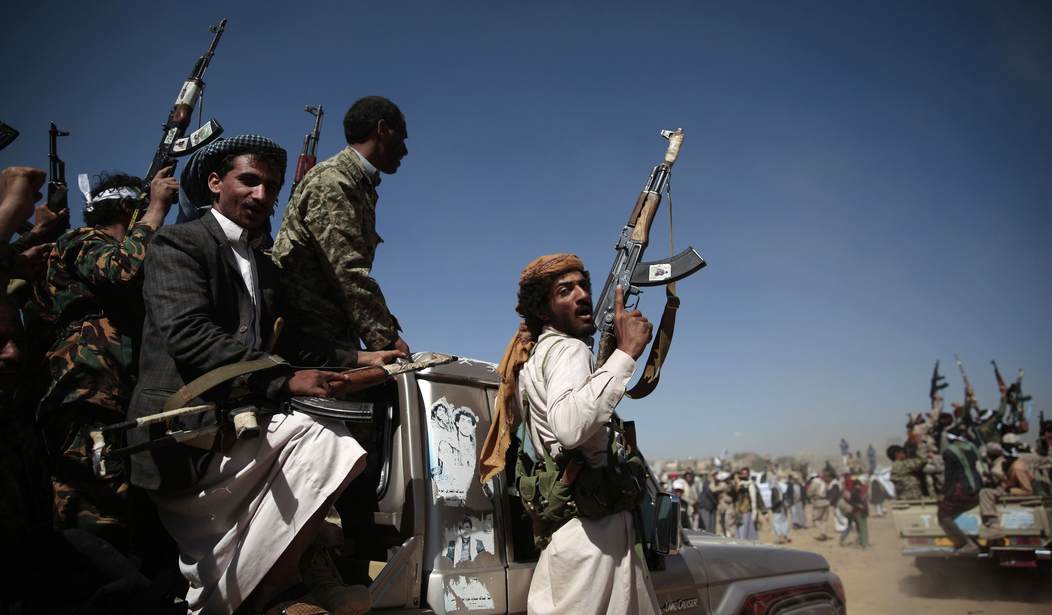This is the second time that the US and UK have launched a joint strike against the Houthis in Yemen. Politico describes it as a large-scale strike.
The U.S. and U.K. conducted large-scale air and missile strikes on Houthi rebel facilities across Yemen on Monday, according to a U.S. and British official, stepping up operations against the militant group as it vows to continue attacking ships in the Red Sea…
The two militaries, with support from Australia, the Netherlands, Canada and Bahrain launched strikes for the first time on Jan. 11, after the Houthis ignored weeks of warnings by Washington and its allies to stop the attacks.
This is reportedly video of the strikes within Yemen:
#Watch: Reportedly US and UK strikes on the Houthis right now pic.twitter.com/ZJQpXTfHgD
— Open Source Intel (@Osint613) January 22, 2024
The US has carried out half a dozen strikes without the UK. All of the airstrikes are aimed at limiting the Houthis ability to strike commercial ships in the Red Sea.
The Iran-backed Houthis have launched over 30 attacks in commercial shipping lanes since November. Although no one has been seriously injured, the attacks have led some shipping companies to direct their ships away from the Red Sea.
The Houthis have not been able to successfully launch an attack since Jan. 18, although it’s not for lack of trying. In two cases over the weekend, the U.S. struck Houthi missiles as the missiles were being prepared to launch, according to statements from U.S. Central Command.
Obviously the Houthis haven’t run out of missiles yet so these strikes to take out radar installations and individual launch sites are going to continue. Yesterday the Washington Post reported the US is preparing for this to go on for an extended time.
The Biden administration is crafting plans for a sustained military campaign targeting the Houthis in Yemen after 10 days of strikes failed to halt the group’s attacks on maritime commerce, stoking concern among some officials that an open-ended operation could derail the war-ravaged country’s fragile peace and pull Washington into another unpredictable Middle Eastern conflict…
Officials say they don’t expect that the operation will stretch on for years like previous U.S. wars in Iraq, Afghanistan or Syria. At the same time they acknowledge they can identify no end date or provide an estimate for when the Yemenis’ military capability will be adequately diminished. As part of the effort, U.S. naval forces also are working to intercept weapons shipments from Iran…
“It’s impossible to forecast exactly what’s going to happen, and certainly not [to predict] future operations,” the first U.S. official said. “But the principle that it simply can’t be tolerated for a terrorist organization … with these advanced capabilities to essentially shut down or control shipping through a key international choke point is one that we feel very strongly about.”
The Houthis have become heroes to some on US college campuses.
And finally, showing their true colors, they chanted *in support of the Houthis* – calling them to keep attacking American and British ships thousands of miles away from Israel or Gaza. @Columbia University let this happen. pic.twitter.com/gXHvRiWLe6
— Shai Davidai (@ShaiDavidai) January 19, 2024
But even as the Houthis are supposedly trying to stop “genocide” in Gaza they are also carrying out their own siege of Yemen’s third largest city.
Yemen’s Houthis are making headlines as they launch missile strikes against civilian ships and crews in the Red Sea, which may amount to war crimes, which they say they will continue to do until Israel lifts its unlawful blockade of Gaza. But less attention is paid to how Houthis block water from reaching civilians in Taizz, the third-largest city in Yemen…
As Human Rights Watch has documented, four out of five of Taizz’s water basins are under Houthi control or on the frontlines of the conflict, making them ultimately inaccessible to the Taizz residents. The Houthis control two of the basins, and they have stopped water from flowing into government-controlled Taizz city, although they know the city’s residents rely on this water.
The Houthis are also blocking and restricting access to water as part of their siege on the city, impeding the entry of water trucks, which people in Taizz who are not connected to the public water network have long relied on.
The Houthis are terrorists, not heroes. They should not be allowed to hold world trade hostage without consequences. And of course it goes without saying that the weapons they are using come from Iran which also shouldn’t be given a pass for yet another anti-western provocation.







Join the conversation as a VIP Member